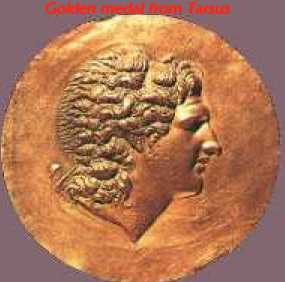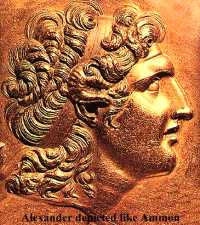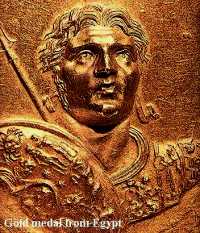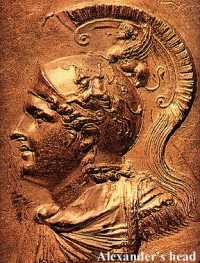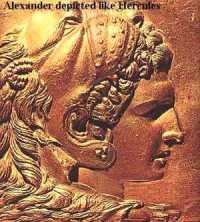Gaugamela (October 331)
When Alexandros defeated Darius in Issus he gathered his family members and told them that they would continue to live as before.
When Mehmet conquered Constantinople he gathered all the Byzantine aristocrats and had them beheaded.
The prime minister Loucas Notaras asked him first to kill his two young boys and after to kill him, because he was afraid
that his two sons, afraid for their lives, would change their faith. So Notaras saw his sons while they were beheaded
and then he kneeled to face his destiny.
In July 331, Alexander sent Hephaestion and Nearhos to ensure a passage through Euphrates River. He was waiting reinforcements from Greece and would follow later. In Tyre he had a meeting with the rabbin of Jerusalem who came to salute the new king and ask him not to harm the Holy city of Jerusalem. According to Flavius Josephus the rabbin told Alexandros that in Daniel's writings there was a text saying that a Greek would catalyze the Persian empire. Alexander left Phoenicia and marched north but Statira, the beautiful wife of Darius became ill and died. The army stopped and the young king ordered that Statira would be buried with solemnity and reverence as a queen. An eunuch escaped from the Greek camp and reached his Persian master to report his wife's death. When he told him that the Yiounan king had respected his wife and hadn't touched her, Darius couldn't believe him. It was difficult for a barbarian to accept that the enemy had respected the honor of his woman. In the meantime, Hephaestion had bridges constructed in Euphrates River, near the phoenician city Thapsacus. The persian satrap Mazeus didn't fight but burnt all the fields and the villages south, so that the Greek army, in order to find provisions, had only one direction to the east to go. The direction was towards Gavgamela.
This was the place, near Arbela, that the Persian king had chosen to fight. Darius had collected the full force of his vast empire, and it was estimated 1 million men (Bactrians, Indians, Medians, Sogdians, Albanians from the Caucasus, Scythians). He also had 200 scythed chariots and 15 war elephants. The Greeks reached the Tigris River, and were surprised that the enemy wasn't to the other side of the flooded river to stop their advance. Indeed, with great difficulty, the Greek army crossed the river, and on 30 September, Alexandros camped on the plain of Gaugamela. There happened lunar eclipse. The omen was explained by Aristandros . The persian empire (moon) would loose, and Hellas (sun) would win. When Xerxes had invaded and had destroyed Greece, then had been sun eclipse and the sun was hidden by the earth. Now this eclipse was favourable for the Greek soldiers. Plutarch writes: "The noise and campfires of the vast barbarian camp were so frightening that some of Alexander's generals advised a night attack because it would be too dangerous to take on such a huge force in daylight. But Alexander replied: "I will not steal victory." So Alexander and his men rested until late the next morning.
On October 1st, the most important day of Alexandros, the two armies were ready to face one another. The Greek army had
40000 men and the cavalry 7000 men. Alexandros commanded the right wing, and
Parmenion the left wing. In the center
was the macedonian phalanx under Koinon, Perdiccas, Meleagros, Simmias and Crateros. The commander of the Hetairoi
was Philotas.
According to Plutarch: "Alexander gave a long speech to the Greeks, who answered
him with loud shouts, whereupon he put his javelin into his left hand and lifted up his right to the gods in a prayer for
victory. Just at that moment, an eagle soared over him and then flew toward the enemy, and this omen put fire in each man's
heart." The brave Macedonian mounted Bucephalus and charged to the left wing of the persian army. Menidas with his
cavalry made the Scythians and the Vactrians under satrap Vessos to retreat. Then Darius ordered his chariots to charge
 against the Greek right wing, but with a few losses the infantry avoided the chariots, and the Greek archers killed
the barbarian charioteers. Alexander now moved to the center with his Hetairoi. Darius didn't wait for long. He
mounted a horse and again turned his back leaving his soldiers. The things were not doing well in the left wing, where
the satrap Mazeus was winning. Parmenion sent a messenger asking for help because the Greek camp and all of the baggage
would be lost to the Persians. Alexander replied to Parmenio that he should remember that if they won, they would not
only recover their own baggage but also take the enemy's; and if they lost, then they would not have to worry about
possessions because their only care would be to die like brave men. Parmenion with the Thessalians fighters
counterattacked and defeated Mazeus who was caught prisoner. About 500 Greeks and more than 50000 Persians lost their lives
on the battlefield.
against the Greek right wing, but with a few losses the infantry avoided the chariots, and the Greek archers killed
the barbarian charioteers. Alexander now moved to the center with his Hetairoi. Darius didn't wait for long. He
mounted a horse and again turned his back leaving his soldiers. The things were not doing well in the left wing, where
the satrap Mazeus was winning. Parmenion sent a messenger asking for help because the Greek camp and all of the baggage
would be lost to the Persians. Alexander replied to Parmenio that he should remember that if they won, they would not
only recover their own baggage but also take the enemy's; and if they lost, then they would not have to worry about
possessions because their only care would be to die like brave men. Parmenion with the Thessalians fighters
counterattacked and defeated Mazeus who was caught prisoner. About 500 Greeks and more than 50000 Persians lost their lives
on the battlefield.
Babylon - Susa
After Gaugamela, Alexandros advanced south and entered Babylon, one of the richest cities of the ancient world. No one was harmed and he was recognized as "king of the four signs of the world". The treasures that were found were innumerable and the new king shared to each of his soldiers 600 drachmas. Mazaeus, who had surrendered the city, was assigned as satrap of Babylon. (Babb - ilou meant gate of God in the assyrian language). The Greeks stayed in this magnificent city for thirty days, organized feasts and lived in the luxury and in the comforts that the Persian aristocrats were used to live before them.
 After six days march Alexander's army appeared before the city of Susa. The persian satrap Avoulites opened the gates
and came to welcome the new ruler. More gold and silver was found in the treasure-house of Susa.
One evening, the young Macedonian sat on the throne of Darius. But he was not a tall man and his feet could not reach the
ground. Then Leonnatos brought a little table, to put his feet on. When an old eunuch saw all this he cried. Alexander asked
him the reason of his sorrow, and the eunuch answered that this was Darius' table and he was served there his dinner. Aristandros said that
this was a good omen and this symbolized that persian empire was under Alexander's feet.
In Susa, the Hellene emperor found the statues of the Athenians
Armodios and Aristogeiton who
had killed the tyrant Ipparchus of Athens. Those statues had been stolen by Xerxes in 480, when he had invaded Hellas.
Alexandros sent them back to Athens.
Darius' mother, Sisygamvis, was setteld again in her rooms inside the vast palace.
Diodorus of Sicily (17.67.1) says:
"Alexander left Dareius's mother, his daughters, and his son in Susa, providing them with persons to teach them
the Greek language, (so that they could speak to him without using translators) and marching on with his army on the fourth
day reached the Tigris River."
Meanwhile the Spartans who couldn't tolerate Macedonians as leaders of Hellas,
rose to a rebellion against them. Antipater, marched from Pella defeated the proud
Lacaedemonians, and killed their king Agis.
After six days march Alexander's army appeared before the city of Susa. The persian satrap Avoulites opened the gates
and came to welcome the new ruler. More gold and silver was found in the treasure-house of Susa.
One evening, the young Macedonian sat on the throne of Darius. But he was not a tall man and his feet could not reach the
ground. Then Leonnatos brought a little table, to put his feet on. When an old eunuch saw all this he cried. Alexander asked
him the reason of his sorrow, and the eunuch answered that this was Darius' table and he was served there his dinner. Aristandros said that
this was a good omen and this symbolized that persian empire was under Alexander's feet.
In Susa, the Hellene emperor found the statues of the Athenians
Armodios and Aristogeiton who
had killed the tyrant Ipparchus of Athens. Those statues had been stolen by Xerxes in 480, when he had invaded Hellas.
Alexandros sent them back to Athens.
Darius' mother, Sisygamvis, was setteld again in her rooms inside the vast palace.
Diodorus of Sicily (17.67.1) says:
"Alexander left Dareius's mother, his daughters, and his son in Susa, providing them with persons to teach them
the Greek language, (so that they could speak to him without using translators) and marching on with his army on the fourth
day reached the Tigris River."
Meanwhile the Spartans who couldn't tolerate Macedonians as leaders of Hellas,
rose to a rebellion against them. Antipater, marched from Pella defeated the proud
Lacaedemonians, and killed their king Agis.
Persepolis
In December 331, the Greek army left Susa and marched south to occupy Persepolis. When they reached Zagros mountain, a savage tribe, Ouxioi asked for money to let them pass through the narrow passage saying: "The Great king used to pay us, in order to pass through this passage." Alexander angry answered them: "I am now the Great king and I will pay you nothing." He crushed them, burned their vilagges and continued his route until he reached the Persian Gates (Persides Pyles).
At Persian Gates the Greeks found strong resistance by the persian garisson which was commanded by the satrap Ariobarzanes. They suffered heavy losses but when at night they held a meeting, a greek slave named Rhedas appeared and offered to help. He guided the Hellenes through a narrow passage, during the night, behind the enemy lines. The Persians surrendered and the road to Persepolis was now open.
Near the city, there was a camp where Greek prisoners of wars were kept. Others had been amputated, others were blind, others had been burnt. When the king talked with them he became angry and sad for their sufferings. The time for revenge for all the catastrophes that Persians had caused to Greek cities had come. Here is how Diodorus Siculus (17.69.1 Library) describes the incident: "At this point in his advance the king was confronted by a strange and dreadful sight, one to provoke indignation against the perpetrators and sympathetic pity for the unfortunate victims. [3] He was met by Greeks bearing branches of supplication. They had been carried away from their homes by previous kings of Persia and were about eight hundred in number, most of them elderly. All had been mutilated, some lacking hands, some feet, and some ears and noses. [4] They were persons who had acquired skills or crafts and had made good progress in their instruction; then their other extremities had been amputated and they were left only those which were vital to their profession. All the soldiers, seeing their venerable years and the losses which their bodies had suffered, pitied the lot of the wretches. Alexander most of all was affected by them and unable to restrain his tears. [5] They all cried with one voice and besought Alexander to help them in their misfortunes. The king called their leaders to come forward and, greeting them with a respect in keeping with his own greatness of spirit, promised to make it a matter of utmost concern that they should be restored to their homes."
The time for revenge for the destruction the Greek temples, the altars and the statues had come. The young Macedonian gave
the order to his soldiers: "The city is yours".
The soldiers poured in the city, slaughtered the poopulation, raped women and girls and all the houses were reduced to ashes.
Next day, Alexander entered in the palace of Darius, and came upon new masses of gold in the royal treasury. Hellenes stayed at
Persepolis for many weeks. One night Alexander burned down the palace of Xerxes, as a symbol that the Panhellenic
war of revenge was at an end. Diodorus Siculus (Library 17.72.1) writes:
 "Alexander held games in honour of his victories. He performed costly sacrifices to the gods and entertained his friends
bountifully. While they were feasting and the drinking was far advanced, as they began to be drunken a madness took
possession of the minds of the intoxicated guests.
[2] At this point one of the women present, Thais by name and Attic by origin, said that for Alexander it would be the
finest of all his feats in Asia if he joined them in a triumphal procession, set fire to the palaces, and permitted women's
hands in a minute to extinguish the famed accomplishments of the Persians.
[3] This was said to men who were still young and giddy with wine, and so, as would be expected, someone shouted out to form
the comus and to light torches, and urged all to take vengeance for the destruction of the Greek temples.
[4] Others took up the cry and said that this was a deed worthy of Alexander alone. When the king had caught fire at their
words, all leaped up from their couches and passed the word along to form a victory procession in honour of Dionysus.
[5] Promptly many torches were gathered. Female musicians were present at the banquet, so the king led them all out for the
comus to the sound of voices and flutes and pipes, Thais the courtesan leading the whole performance.
[6] She was the first, after the king, to hurl her blazing torch into the palace. As the others all did the same, immediately
the entire palace area was consumed, so great was the conflagration. It was most remarkable that the impious act of Xerxes,
king of the Persians, against the acropolis at Athens should have been repaid in kind after many years by one woman, a
citizen of the land which had suffered it."
"Alexander held games in honour of his victories. He performed costly sacrifices to the gods and entertained his friends
bountifully. While they were feasting and the drinking was far advanced, as they began to be drunken a madness took
possession of the minds of the intoxicated guests.
[2] At this point one of the women present, Thais by name and Attic by origin, said that for Alexander it would be the
finest of all his feats in Asia if he joined them in a triumphal procession, set fire to the palaces, and permitted women's
hands in a minute to extinguish the famed accomplishments of the Persians.
[3] This was said to men who were still young and giddy with wine, and so, as would be expected, someone shouted out to form
the comus and to light torches, and urged all to take vengeance for the destruction of the Greek temples.
[4] Others took up the cry and said that this was a deed worthy of Alexander alone. When the king had caught fire at their
words, all leaped up from their couches and passed the word along to form a victory procession in honour of Dionysus.
[5] Promptly many torches were gathered. Female musicians were present at the banquet, so the king led them all out for the
comus to the sound of voices and flutes and pipes, Thais the courtesan leading the whole performance.
[6] She was the first, after the king, to hurl her blazing torch into the palace. As the others all did the same, immediately
the entire palace area was consumed, so great was the conflagration. It was most remarkable that the impious act of Xerxes,
king of the Persians, against the acropolis at Athens should have been repaid in kind after many years by one woman, a
citizen of the land which had suffered it."
Another day, Leoharis, one of the myriads who had followed Xenophon and was ninety years old, met Alexander and told him: "I came with Xenophon to fight in Mikra Asia. I am the only one who still survives. Now that I have seen you on the throne of the Great king, I can go and die pleased and proud." Of all the things that Alexander won from Darius, the most precious was an exquisite box. He asked his friends what treasure he should keep in it. There were various suggestions, and good arguments why each was the most precious thing that he owned, but Alexander finally declared that the honor would not go to any of these but to his annotated copy of the Iliad. Later he sent this box to his teacher Aristotle. Another present that he sent back to Greece, a huge quantity of frankincense and myrrh went to his tutor, Leonidas. The reason for this gift was that one day, when Alexander was still a boy, Leonidas had told him not to use so much of these spices in the sacrifice he was performing, saying: "When you have conquered the countries where these things grow, then you may be more lavish, but for now do not waste the little that we have." Alexander sent the following note with the gift: "We send you plenty of frankincense and myrrh so that in the future you will not be a niggard to the gods."
 _____
_____


